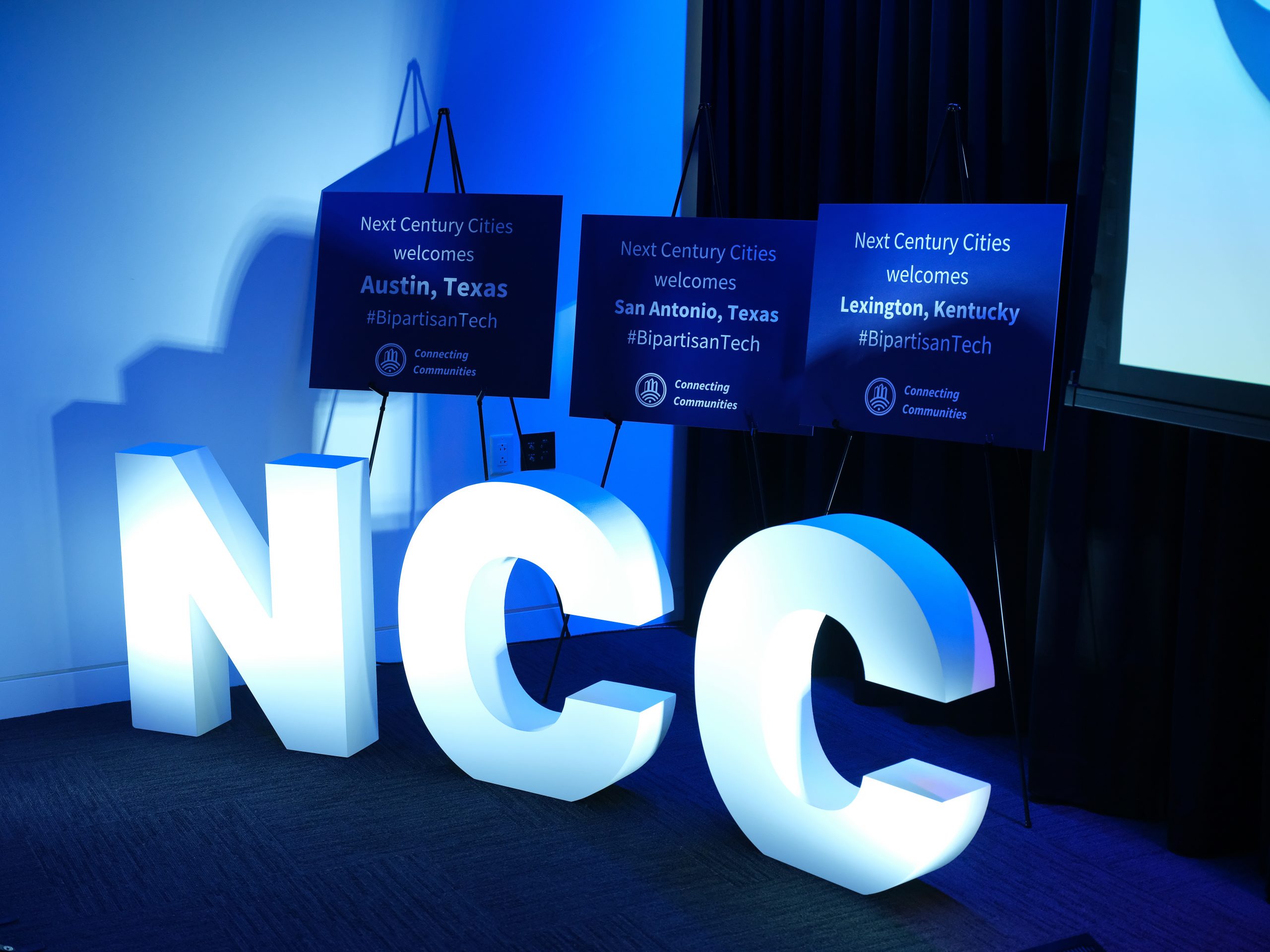By Ryan Johnston and Corian Zacher

Next Century Cities, in conjunction with the National Association of Telecommunications Officers and Advisors (NATOA) and other allied organizations, filed a March 9th letter, accompanied by a list of principles, Pole Attachments and the Public Interest. The letter and principles reiterate the need for policymakers to allow municipalities, public power utilities, and cooperatives—whose purpose is to serve the public interest—flexibility and trust to manage their poles and other assets in the best interest of their communities.
Autonomy over pole attachment policy is integral to local broadband strategies.
The influx of broadband funding and the national focus on municipal networks is bringing much-needed attention to state policies that impede local autonomy over Internet infrastructure. The Coalition for Local Internet Choice reports that 17 state laws inhibit community-owned broadband networks or public-private partnerships. In effect, state imposed restrictions that curb local self-determination over pole attachments can ultimately hinder broader efforts to expand broadband networking capabilities. Instead, state policies should complement local decision-making, which is critical for ensuring that all residents can access and adopt high-quality home broadband.
In 2021, for example, California lawmakers proposed a bill that would have severely limited local authority over street light and traffic signal poles. Despite opposition from several municipalities—including cities in NCC member Counties Sonoma and Santa Clara, such as Sebastopol and Los Altos—the legislature passed the bill, which was subsequently vetoed by Governor Gavin Newsom.
Local governments share state and federal desires to improve and expand high-quality, affordable broadband service. Still, they have often been treated as obstacles to rather than partners in closing the digital divide. This posture discounts the important strides that local governments and community partners nationwide have taken to improve broadband, too frequently without state and federal support.
Utility Pole Regulations Directly Impact Quality of Life.
Local governments are uniquely positioned to help state and federal policymakers improve broadband access while balancing other important concerns, including public safety, environmental preservation, and equitable, resilient infrastructure deployment.
On January 20, 2022, the New York Public Service Commission announced a settlement with a fiber provider in Rochester, an NCC member municipality, for alleged public safety violations. The agreement specified an immediate $2.5 million payment to the State Broadband Office for broadband installation in unserved and underserved New York communities. Although residents in cities like Rochester were directly impacted by the alleged action, they are unlikely to see those dollars because their communities are already considered served on state and federal maps.
As utility poles age and new technologies require access, state and federal policymakers are seeking to address the debate around pole replacement costs. Legislators in New York, Florida, and Texas have envisioned a role for their states in funding and regulating pole replacement costs.
The FCC has a Long History With Pole Attachments.
The Federal Communications Commission (FCC) currently regulates the activity related to utility pole attachments in 29 states. Under Section 224 of the Telecommunications Act, the FCC is responsible for regulating the rates, terms, and conditions of new attachments. The statute tasks the FCC with ensuring that access to utility poles is non-discriminatory and that modification or replacement to the pole is made with proper notice to other attachers.
In 2011, the FCC expanded on its Section 224 regulations, including new timelines for pole attachments and requiring pole owners to explain requests for attachment denials. Again in 2018, the FCC updated OTMR policies that reformed the federal framework governing pole attachments.
The FCC can be a Supportive Partner for Municipalities that Govern Their Own Pole Attachment Policies.
NCC and NATOA’s letter and principles document urged the FCC to partner with municipalities, communications workers, public power utilities, and cooperatives. The submission also highlighted the disparities between for-profit pole owners and public pole owners which are accountable to their constituents.
For municipalities that do not own their own utility poles, negotiating pole attachment agreements with investor-owned utilities could ultimately lead to higher pole rents than competitors pay. Imposing new burdens and limitations on municipalities’ ability to oversee their assets may also have unforeseen costs. New federal regulations can reduce local revenues and increase costs, potentially creating passthrough harms to consumers. These types of top-down regulations attempt to address widely varying issues with a one-size-fits-all approach that inevitably slows broadband deployment.
FCC efforts to facilitate information sharing across municipalities and furnish them with resources that can support local efforts to expedite broadband solutions would yield exponential benefits to consumers. Flexibility in pole attachments and local broadband strategies writ large is essential for implementing community-specific solutions. As new funding is distributed, the FCC must work closely with municipalities to avoid promoting policies that could bottleneck deployment and create new barriers to entry.
Additional Resources:
- NCC Urges the FCC to Protect Local Authority Over Pole Attachment Costs
- Biden’s Municipal Broadband Push Clashes With State Restrictions
- Are Pole Attachment Rules Getting in the Way of Broadband Deployment?
- “One Touch” Make-Ready Policies: The “Dig Once” of Pole Attachments
- Next Century Cities’ Guide to Pole Attachments

